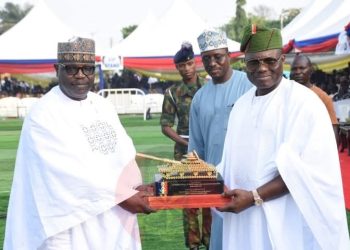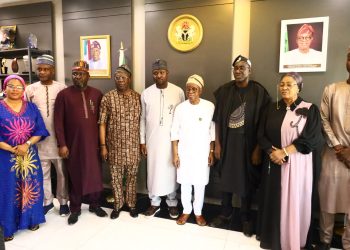By Nkechi Eze
Nigeria on Monday entered a new phase in its national security trajectory as the President of the Senate, His Excellency Senator Godswill Akpabio, GCON, formally unveiled the National Counter-Terrorism Centre (NCTC)’s Strategic Plan 2025–2030, describing it as a decisive step toward defeating terrorism and strengthening national stability. The high-level ceremony, held in Abuja, brought together senior government officials, heads of security and intelligence agencies, members of the diplomatic corps, private-sector leaders and development partners, signalling the broad coalition required to implement the country’s most comprehensive counter-terrorism plan to date.
Senator Akpabio said the five-year strategy embodies Nigeria’s renewed determination to modernise its security architecture and shield citizens from increasingly sophisticated threats. He noted that years of insecurity have weakened national development, discouraged investors, disrupted education, destabilised agriculture and eroded hope in several communities. According to him, the new framework provides a disciplined roadmap for transforming national institutions, integrating technology-driven approaches, strengthening intelligence coordination and deepening collaboration across government and society.
While emphasising that the National Assembly will continue to pass laws that strengthen the defence, intelligence and counter-terrorism system, the Senate President warned that legislation alone does not secure a nation. He called for sustained investments in technology, personnel and partnerships, stressing that the Strategic Plan stands out because it embraces a Whole-of-Government and Whole-of-Society model that places citizens at the heart of national security. Akpabio identified three critical pillars of the plan, reinforcing national resilience through early-warning and community intelligence, deploying advanced technologies including drones and cybersecurity systems, and expanding regional and international cooperation to counter transnational threats.
A key highlight of the event was the fundraising component tied to the launch, which the Senate President described as a necessary and forward-thinking approach. He argued that government cannot, on its own, finance the vast and complex security demands of the digital age, and called on the private sector to partner actively with the state in securing the nation. He assured stakeholders that the National Assembly will strengthen legal frameworks that ensure accountability and transparency in such partnerships and committed to close legislative oversight of the plan’s implementation to guarantee measurable results and prudent financial management. Akpabio described the Strategic Plan as “a national promise that Nigeria will not surrender to fear,” urging citizens, traditional rulers, civil society, youth groups, the private sector and international partners to unite in safeguarding the country’s future before formally unveiling the document.
Representing the Chairperson of the African Union Commission, Dr Usman Hussain delivered a goodwill message that commended Nigeria for showing consistent leadership in counter-terrorism across West Africa. He said the transformation of the NCTC into a regional centre of excellence aligns with continental frameworks, including the AU Roadmap on Silencing the Guns, the African Peace and Security Architecture and the Continental Plan of Action on Preventing and Countering Violent Extremism. Hussain praised the inclusive and consultative process that shaped the plan, noting its clear emphasis on intelligence sharing, cross-border cooperation, early-warning systems and community-based prevention.
The AU envoy stressed that terrorism in the Sahel and West Africa remains transnational and requires coordinated responses. He disclosed that the African Union will deploy a technical assessment mission to the NCTC in December 2025 and will host a high-level Nigerian delegation in Algeria in January 2026 to strengthen peer review, planning and capacity-building. He further applauded Nigeria’s fundraising approach, noting that sustainable financing is essential for successful counter-terrorism efforts, and affirmed the AU’s commitment to supporting Nigeria in promoting regional peace and stability.
The National Security Adviser was represented by Major General Adamu Laka, National Coordinator of the National Counterterrorism Centre, who delivered the NSA’s remarks. He observed that Nigeria continues to confront evolving terrorism threats from the Northeast to emerging hotspots in the Northwest and Southeast. He explained that the Strategic Plan was developed to provide a coordinated, forward-looking and research-based national roadmap informed by lessons from over two decades of counter-insurgency operations. According to him, the plan aligns with the Terrorism Prevention and Prohibition Act 2022 and builds upon the gains of previous national counter-terrorism strategies.
Major General Laka highlighted the underlying social drivers of violent extremism, noting that unemployment, drug abuse and lack of economic opportunities continue to expose many young people to radicalisation and criminal recruitment. He explained that while international partners have long played a supportive role, Nigeria must now build stronger, capable national institutions that take greater responsibility. He noted that the NCTC has signed multiple agreements with international organisations and recently partnered with the International Institute of Tropical Agriculture on the “Seeds of Hope” programme, which focuses on rehabilitating victims of terrorism, particularly widows and other vulnerable groups through agricultural livelihoods.
He said the new strategic direction seeks to strengthen intelligence, operational coordination, legal frameworks, judicial processes, strategic communication and national resilience. He described the Strategic Plan as ambitious but necessary for reinforcing Nigeria’s leadership in regional counter-terrorism efforts and reaffirmed the commitment of the Office of the National Security Adviser, the NCTC and partner agencies to its full implementation.
Development partners, diplomatic missions, security leaders, private-sector institutions and civil society groups at the event pledged support for the strategy, describing it as a crucial step toward stabilising Nigeria’s security environment and boosting economic confidence.
The ceremony drew to a close with the formal unveiling of the Strategic Plan 2025–2030, marking the beginning of a new and coordinated phase in Nigeria’s efforts to combat terrorism and violent extremism across all fronts.
















